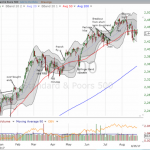CoreLogic’s Home Price Index (HPI) shows that home prices in the USA are up 5.6 % year-over-year (reported up 0.4 % month-over-month). CoreLogic HPI is used in the Federal Reserves’ Flow of Funds to calculate the values of residential real estate. The quote of the day was in this data release:
…. By waiting to sell, homeowners believe they will get the greatest return on their investment; the more money they have for a downpayment, the easier the purchase payments will be for their next home …

Analyst Opinion of CoreLogic’s HPI
Last month the stated year-over-year increase was published 5.5% – which makes this month marginally higher year-over-.year. Note that CoreLogic forecasts:
Looking ahead, the CoreLogic HPI Forecast indicates home prices will increase by 4.7 percent on a year-over-year basis from September 2018 to September 2019. On a month-over-month basis, home prices are expected to decrease by 0.6 percent from September to October 2018. The CoreLogic HPI Forecast is a projection of home prices calculated using the CoreLogic HPI and other economic variables. Values are derived from state-level forecasts by weighting indices according to the number of owner-occupied households for each state.
CoreLogic is forecasting a slower rate of home price increases.
According to CoreLogic:
…. revisions with public records data are standard, and to ensure accuracy, CoreLogic incorporates the newly released public data to provide updated results.
Dr Frank Nothaft, chief economist for CoreLogic stated:
The erosion of affordability in the highest cost markets has begun to slow home price growth. Hawaii, California and Massachusetts had median sales prices above $400,000 this summer, the highest in the nation, while annual home price growth slowed steadily between June and September in these three states. When comparing September 2018 with September 2017, annual price appreciation slowed more in these states than in the U.S overall. Nationally, annual price growth slowed 0.5 percentage points. However, in Hawaii, California and Massachusetts growth rates decreased by 1.7, 0.7 and 1 percentage points, respectively.













Leave A Comment